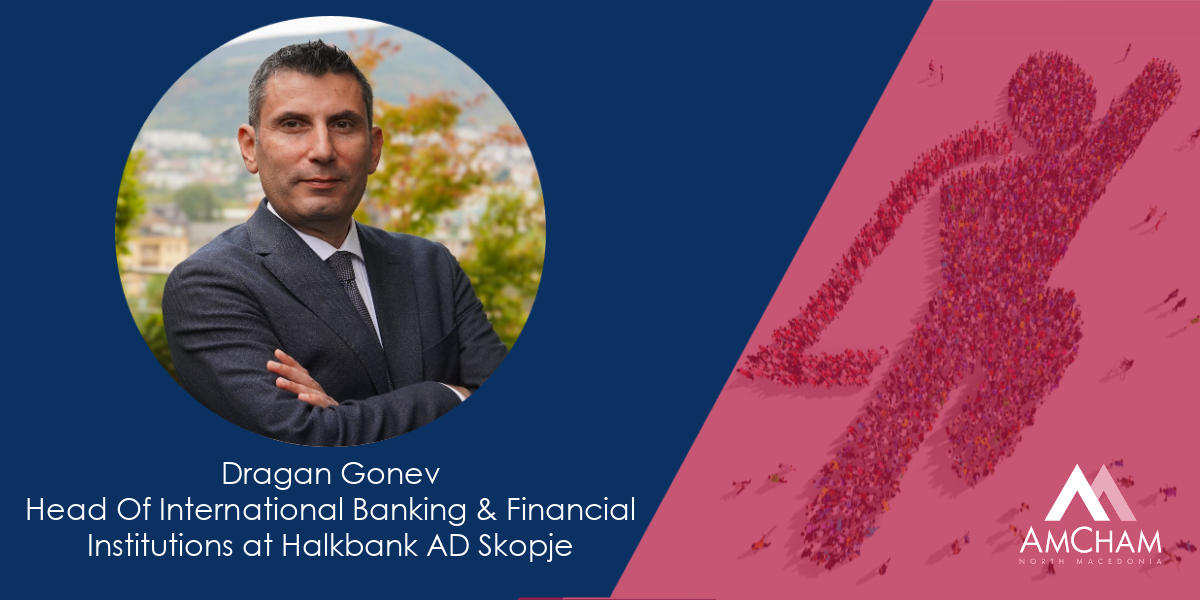*Interview with Mr. Dragan Gonev, Head Of International Banking & Financial Institutions at HALKBANK AD Skopje
Halk Bank becomes part of the companies which are implementing the ESG strategy (Environmental, Social, Governance), showing its dedication for understanding and managing the environmental influence, social issues and management practices. The primary motivation of Halk Bank for implementing this strategy is rooted in the idea of active participation in achieving sustainable development and capitalizing on its benefits. Recognizing in parallel the importance of the financial sector in balancing between economic growth and sustainable practices for building a prosperous future, Halk Bank sees the implementation of a comprehensive ESG strategy as a factor which will generate positive results in the operation of and development of the bank itself by improving risk management, creating new opportunities for accessing long-term sources of financing and harmonizing the corporate strategy with increased awareness for sustainability in new generations.
1.Through the bank’s slogan “People are important”, Halk Bank has built a reputation of a company which has a high degree of corporate care for societal issues, which are one of the three ESG pillars and which among other things entail relationships with employees. Can you share examples of how this philosophy reflects in the bank’s everyday work and decision-making processes?
The corporate care for social issues is part of the corporate strategy of Halk Bank through which the impact from the business activities on the environment, clients, employees and other stakeholders is monitored. The bank implements corporate and social responsibility in its everyday work, as well as in the process of making business decisions through various initiatives.
Halk Bank actively works on reducing its carbon footprint with various environmental activities and initiatives which positively reflect on the environment. The bank through its ethical and business practice adheres to fair work standards for its employees and equal access for everyone, which positively impacts employee engagement, i.e. nurtures a positive work culture. Within this initiative are the opportunities for personal and professional development of all employees and achieving a work-life balance.
Apart from these initiatives which are practiced by the bank, the societal and social responsibility is implemented in the products themselves which are defined as products that promote social wellbeing and sustainability. Namely, Halk Bank has developed a wide variety of products through which it provides support to small and medium enterprises, women entrepreneurs, as well as loans for new job creation, self-employment etc. In addition, in the past 20 years, as a banking sector pioneer of green financing, and in cooperation with domestic and international financial institutions, there was continuous support through green loans for its clients.
As part of the ESG strategy, the bank created a special platform for supporting women within the framework of which a special business package for women entrepreneurs was created. The idea of this business package is to facilitate access to financing under favorable conditions to companies where founders or owners are women. Apart from the business package, within the framework of the broader platform for supporting women, the bank recently organized creative campaigns and events. The last campaign of this type was the campaign “Dresses with pockets” which was dedicated to the promotion of equality, financial independence and support of women. This campaign had a humanitarian character as well, i.e. the funds collected at the auction were donated to the National Network to End Violence against Women and Family Violence. During the month of November, under the motto “We inspire and encourage each other” the first business conference of women entrepreneurs “HalkTalk 2023” was organized.

The benefits from the successful integration of a high-quality strategy for corporate and social responsibility are visible also through the results of operational activities and in the process of making high quality business decisions every day. Over the years, the successful strategy has helped the bank in building a positive reputation with its clients and employees. Our clients recognized the bank’s commitment for social and environmental responsibility, which enabled an increase of the number of new clients which decided to join and support this commitment of the bank. All this contributed to create a positive work culture of the employees, with increased work satisfaction and bigger engagement and motivation.
If everything mentioned above needs to be summed up, it can be said that by incorporating the ESG strategy in everyday operations and decision-making processes, additional long-term value for our clients was created, but also a better positioning of the bank for overcoming the challenges of the dynamic business environment, thus providing sustainable growth and a positive societal impact.
2. Can you give examples of initiatives or projects that the bank has undertaken for active involvement and support of the local community? How does the bank guarantee that its efforts for engaging the community are aligned with the needs and priorities of the communities it serves?
When it comes to the bank’s initiatives for supporting the local community, we can safely say that all employees are part of this story, including the top management. In order to get to the needs of the local community in a simpler way, the bank participates in various interviews, surveys and works with certain focus groups. By understanding and detecting the needs, Halk Bank managed to better align its efforts for engaging the local community to which it unreservedly serves.
The effect from this social engagement of the bank is measured in multiple ways. Measuring the impact of our community engagement projects has helped us to understand better how out initiatives contribute to the needs and priorities of the communities we serve. Through these projects, apart from economic impact and benefits such as new jobs and improved productivity, we cannot ignore the social impact. An important factor for measuring the quality of these projects is the local community engagement, i.e. the level of engagement between the stakeholders and the community, the number of volunteers, number of events, their attendance etc. With the successful implementation of these projects, the effect on the environment was positive, i.e. there were numerous environmental benefits such as reduced carbon emissions and improved air quality.
As examples of such initiatives and projects, we can especially emphasize the platforms Halky – which focuses on the financial education of children, Wisdom keepers – which is focused on seniors, the HALK-ECO platform – through which numerous events were organized, such as Skopje runs 10k and the bike race Halk Velo Green.



In addition, the bank has supported numerous events and projects related to sports, education, culture and the environment. An example for this type of events and initiatives are the international festival for literature and illustrations for children and youth “Litera”, the international film camera festival “Manaki Brothers”, the Ohrid film festival, support for the ZOO etc. Also, for the regions hit by the disastrous earthquakes in Turkiye, Halk Bank provided a donation of EUR 500,000.
3. In what ways does the bank prioritize employee satisfaction? Are there unique programs or benefits for employee satisfaction which you may emphasize? How does the bank measure the success of its initiatives for employee wellbeing?
One of the main priorities of Halk Bank is employee satisfaction and wellbeing which are nurtured through various employee engagement programs. These programs are aimed at increasing motivation, strengthening morale and retaining top talent. There are several ways through which Halk Bank measures its employees’ satisfaction. One of them is by conducting regular surveys with which the needs and preferences of its employees can be better understood, so that the Bank can adapt its strategy to fulfill its employee expectations. In addition, two-way communication is promoted, which encourages open communication between employees and the management which assists in building trust and stimulating the sense of belonging.
Halk Bank has implemented an appropriate system for hearing the voice of its employees through which it receives feedback and recommendations from employees. This system helps to identify the areas which require improvement, but also to send a clear message that the bank respects the opinion of its employees. Other initiatives in this context are public recognition of employee achievements, organizing recreational activities such as sporting events, communal weekends for better bondage of employees and their identification with the bank. In this context, we must mention the regular rewards for all employees, while preserving the system of justness, regular salary adjustments, private health insurance for employees and their family members etc.
One of the main premises of Halk Bank is focusing on investment value rather than on monitoring the return on investment. By focusing on investment value, the non-financial benefits from initiatives are measured, such as satisfaction, loyalty and employee engagement. Employee wellbeing is a growing key factor in the “S” segment of ESG policies, bearing in mind that the physical and mental wellbeing of employees has a direct impact on business performances and client satisfaction. Apart from that, by implementing the ESG strategy, Halk Bank continues to declare its dedication to the “greater good”, by which it becomes a more attractive place for current and new employees which strive toward having a sense of “mission” in their job. In short, Halk Bank continues to invest in its human potential as one of the main premises for implementation of a high quality ESG strategy.
4. How does the bank ensure fair and ethical treatment of its clients, i.e. are there any measures and activities intended for protecting the interests of its clients and improving their experience in working with the bank? Can you share examples of client-facing initiatives that the bank has implemented in this regard?
Part of the corporate strategy of Halk Bank is providing fair and ethical treatment to its clients, which is ensured by taking measures and activities towards protecting their interests, as well as improving their experience in working with the bank. One of the measures is equal and just treatment of clients, i.e. a result-based system designed to ensure fairness for all clients during its operation. Halk Bank has geared its products and services towards ensuring a simple and fair model for cooperation with clients, and the products and services are communicated in a transparent and easily understandable manner.
Based on this, Halk Bank creates a perception of a partner who in his corporate culture adheres to fair and equal treatment of all clients. With these measures and initiatives, the bank not only protects client interests, but at the same time improves their experience in working with the bank. The people deserving the credit for the success of this strategy are all the employees that understand the importance of client focus and who tend to improve it every day.
For these purposes, the bank alots a share of its budget which is used for continuous investment in its employees, their additional education, market research, as well as gathering and processing of relevant data. Through all of this, a culture of client orientation and focus was created, whose importance is understood by all employees, and they constantly strive to improve it. With investment in its employees, the goal of better understanding the needs of clients was achieved. The starting point for defining the bank’s products are client needs and experiences, as well as how and when they need a certain product or service.
There are multiple benefits from implementing the ESG strategy at Halk Bank. The starting point was to better understand and manage the climate challenges that we all face. However, recognizing the key role of the financial sector in improving the resilience of society as a whole, was also a significant factor which just contributed to strengthening the relationships of the bank with all stakeholders, including employees, clients and investors. Banks as socially responsible institutions not only have the need, but also the obligation to implement an ESG strategy in their everyday business operations.

